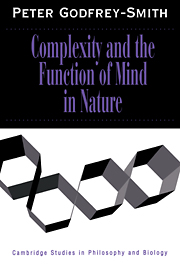4 - Dewey's version
Published online by Cambridge University Press: 05 June 2012
Summary
Meetings and departures
Spencer and Dewey? Spencer the scientistic, laissez-faire Victorian who believed in laws of progressive change and explained mind in terms of astronomical rhythms making our lives more complicated … and Dewey the great American liberal, the man who thought ontological guarantees of progress only deflect people from bringing improvement about themselves, and who thought intelligence functions in the transformation of environments? Dewey has been befriended by foes of systematic philosophy such as Richard Rorty (1982). Even postmodernists approve of Dewey. For people like that Spencer embodies all the callousness, arrogance and folly of science-worship and system-building.
It is not an obvious combination, but the idea I am calling the environmental complexity thesis lies close to the heart of Dewey's epistemology. Let us have some cards on the table. Here is a passage from Dewey's Experience and Nature (1929a) which I take to express a version of the environmental complexity thesis:
The world must actually be such as to generate ignorance and inquiry; doubt and hypothesis, trial and temporal conclusions; the latter being such that they develop out of existences which while wholly “real” are not as satisfactory, as good, or as significant, as those into which they are eventually reorganized. The ultimate evidence of genuine hazard, contingency, irregularity and indeterminateness in nature is thus found in the occurrence of thinking. (1929a, p. 69)
In Dewey's epistemology an important role is played by a contingent fact about the pattern of nature: the balance which actual environments display between the stable and the unstable, the reliable and the capricious.
- Type
- Chapter
- Information
- Complexity and the Function of Mind in Nature , pp. 100 - 130Publisher: Cambridge University PressPrint publication year: 1996

